This program provides an opportunity to study Church History at the graduate level without the commitment of a full master’s degree. Participants will gain a comprehensive overview of major stages in Catholic Church history and the ability to critically analyze significant historical events within the Church. By integrating theological and secular methodologies, students will explore their interplay in historical contexts and interpret trends in ecclesial historiography. The program also fosters the development of advanced reading skills, enabling students to engage critically with historical texts while drawing on the best scholarship and the rich tradition of the Church.
Course Number | Course Title | Credits |
|---|---|---|
THEO 503 | The Catholic Theological Tradition | 3 credit hours |
CHIST 514 | Church History I: Early Christians to Middle Ages | 3 credit hours |
CHIST 524 | Church History II: Renaissance to Modern Church | 3 credit hours |
THEO 632 | Introduction to Christology | 3 credit hours |
Catholic International reserves the right to substitute suitable comparable courses different from the ones listed for the student to complete the certificate.
Course Number | Course Title | Credits |
|---|---|---|
CHIST 544 | History of the American Catholic Church | 3 credit hours |
CST 500 | Foundations of Catholic Social Thought | 3 credit hours |
CST 510 | Social Doctrine of the Church, 1891-1965 | 3 credit hours |
CST 520 | Catholic Social Teaching: Pope St. Paul VI to Pope Leo XIV | 3 credit hours |
EDU 510 | Foundations of Western Education | 3 credit hours |
SCRPT 530 | Introduction to Scripture and Salvation History | 3 credit hours |
SCRPT 616 | History of Biblical Interpretation I | 3 credit hours |
SCRPT 617 | History of Biblical Interpretation II | 3 credit hours |
Courses are 8 weeks long unless otherwise noted.
Catholic International University Provides:
An education in Theology can truly awaken and inform you as a human person of God. And by including Catholic Social Teaching in your educational program, Catholic International University provides you with the tools to transform society while respecting the way God created our world and making use of the freedom He has given us.




